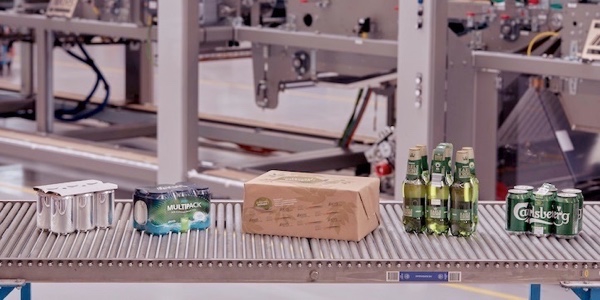Packaging
Boosting efficiency and saving on resources: KHS presents a diverse packaging portfolio

Friday 07. April 2023 - From May 4 to 10 the trade show in Düsseldorf, Germany, will be the hub of the global packaging industry. At this years interpack KHS will be presenting its diverse portfolio of resource-conserving systems to promote the circular economy.
KHS Innopack Kisters Nature MultiPack machine will be on show by way of example that proves convincing with further developments such as a new universal adhesive. With its range of holistic services KHS is able to facilitate customer decision-making processes thanks to the use of independent calculator tools that assess the carbon footprint of various styles of packaging in direct comparison. Further technologies such as robots for efficient high-speed palletizing operations and modular automation systems for format changeovers round off KHS collection of exhibits at the show this year.
Dr. Johannes T. Grobe, CSO of the KHS Group, emphasizes just how important interpack is for KHS. “This trade show has always been a key venue for the international packaging industry. Its a driver of the transformation towards more environmental protection and efficient production processes. This is precisely where we come in with our holistic systems and solutions, advising our customers on suitable machinery tailored to their specific requirements,” he says.
Further Nature MultiPack developments
The tried-and-tested Nature MultiPack (NMP) machine will take center stage at KHS show booth as a prime example of the companys vast range of pioneering packaging systems. One of the most sustainable types of secondary packaging on the market, it joins beverage cans or PET bottles together to form stable packs with just a few dots of adhesive – without any additional outer packaging whatsoever. Saving up to 90% in materials, this technology is compelling and has now been consistently further developed, with a new universal adhesive applicable to practically all outer coatings on both aluminum and tin cans. The one-fits-all system already in successful practical operation makes it easier for numerous beverage producers to convert to NMP – for to date, choosing the right adhesive was often a laborious process.
More informed decisions on climate-friendly packaging
In order to determine which style of packaging has which impact on the climate and whether a conversion for a stretch blow molder, for instance, has a positive effect on the carbon footprint or not, KHS has developed a number of carbon calculator tools. This free service has been developed together with the Hamburg Institute for Environmental IT, a leading independent international software developer for material and energy flow analyses. “Our systems and solutions aim to create continuous added value while reducing the ecological footprint,” says Grobe. “The pressure on the packaging industry for more sustainability is growing – from both consumers and legislators. We thus provide our customers with guidance and help them in their decision to buy by directly comparing different packaging systems.”
Modular automation systems for format changeovers
The systems suppliers plant engineering not only protects the environment; digital services also make for safer and more efficient production processes. In this context, KHS will be presenting its modular automation systems for format changeovers during the packaging of beverage cans and PET bottles. The increasing variety of these types of container often requires bottlers to make frequent adjustments at the packaging and palletizing end of their production lines. With the new option for all KHS packers in the Advanced series and PB palletizer models, up to 80% of all manual tasks required in conjunction with a line changeover are now superfluous. This allows operators to save up to 30 minutes for each packaging and palletizing format changeover.
The new Innopal PLR high-performance palletizer helps to further boost efficiency at the packaging and palletizing end of a line. This combines the benefits of low-feed machines with the capacities provided by palletizers with a high infeed. With the help of robots, this machine processes up to 625 layers per hour which amounts to a nominal capacity of 135,000 cans an hour depending on the can diameter. This machine can of course also palletize PET containers and glass bottles. Using robots also simplifies operation, thus considerably increasing both the efficiency and availability of production.
“With our diverse portfolio of primary and secondary packaging we can provide the best respective system to satisfy a whole range of demands and requirements. This means that were always at our customers side as a partner they can depend on, helping them to steadily reduce their consumption of energy and resources and promote the circular economy,” Grobe concludes.
